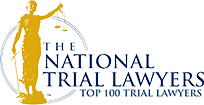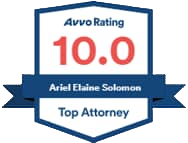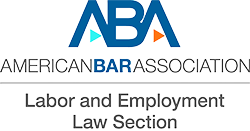Washington DC Security Clearance Lawyer
Award-Winning Security Clearance Attorney - (866) 833-3529
Since September 11, 2001, the federal government has dramatically expanded the scope and nature of federal positions that require a clearance. An increasing number of federal employees, military personnel, and contractors must protect their clearance.
The successful acquisition and maintenance of security clearance is an elaborate process. It is an affirmation from the federal government that you can be trusted with sensitive information. An individual will only be granted a clearance if the government finds doing so is in the interest of national security.
When You Need Experienced Counsel, Call Solomon Law Firm, PLLC
- We Represent Federal Employees Around the World
- We represent Federal Contractors and Businesses requiring security clearances
- We're Backed by a Track Record of Success
- Our Accolades Include a 10/10 Avvo Rating, Super Lawyers® Selection, and listing among Washington D.C.'s Best Lawyers in America
- We represent members of the Armed Services
Do I need a Security Clearance Attorney?
If you are in the process of submitting an initial security clearance application (SF-86), undergoing a background investigation, or facing the denial or revocation of your security clearance, we encourage you to reach out to Solomon Law Firm, PLLC.
A security clearance is a mandatory requirement for individuals seeking access to sensitive or classified federal government information. Over the years, the process of obtaining, retaining, or upgrading a security clearance has become increasingly challenging.
Our team of dedicated lawyers understand the unique complexities with navigating the government's review of security clearance cases. We provide comprehensive representation to federal employees, federal contractors, military personnel, and private sector employees, both domestically and internationally, throughout every stage of the security clearance process.
Among the most common questions we receive are whether a DUI or past drug use could prevent you from qualifying for a Top Secret clearance. The answer is that it depends on many factors, including the guidelines discussed below.
An experienced security clearance attorney at our firm can review your case and advise you on your rights and options. We can help put you in the best position to keep or acquire a security clearance
How can Solomon Law Help?
- We offer guidance and counseling to complete security clearance forms such as e-QIP, SF-85P, and SF-86
- Assist with preparation for investigative interviews
- Provide representation during the polygraph process
- Craft responses to Statement of Reasons, Notices of Intent to Deny or Revoke a Clearance, and Interrogatories
- We represent clients in security clearance hearings before federal government agencies such as DOHA, DOE, DHS, DOJ, and the Intelligence Community
- We Handle appeals for adverse security clearance proceedings
- We provide assistance with requests for security clearance reconsideration
Need help maintaining or obtaining a security clearance? Call (866) 833-3529 or use our online contact form to reach Solomon Law Firm, PLLC.



Can I Qualify for a Security Clearance?
In today’s post 9/11 world, more federal agencies are required to issue security clearances than ever before. Agencies like the Department of Defense and the Central Intelligence Agency have long required security clearances. However, agencies like the Department of Energy now require clearances for an increasing number of positions.
To obtain a clearance, you will have to undergo a comprehensive background check. Any adverse information could jeopardize your ability to acquire or maintain your clearance.
Federal law regarding security clearances consists of a complex web of regulations. The most significant of these is Executive Order 12968. This establishes the baseline standards that govern access to sensitive information, enforced using adjudicative guidelines.
Security clearance decisions consider one's past and present behavior to make a whole-person assessment. Guidelines provide a roadmap for how the government will evaluate your application.
The thirteen guidelines the government will use to evaluate your fitness include:
- GUIDELINE A: Allegiance to the United States
- GUIDELINE B: Foreign Influence
- GUIDELINE C: Foreign Preference
- GUIDELINE D: Sexual Behavior
- GUIDELINE E: Personal Conduct
- GUIDELINE F: Financial Considerations
- GUIDELINE G: Alcohol Consumption
- GUIDELINE H: Drug Involvement and Substance Misuse
- GUIDELINE I: Psychological Conditions
- GUIDELINE J: Criminal Conduct
- GUIDELINE K: Handling Protected Information
- GUIDELINE L: Outside Activities
- GUIDELINE M: Use of Information Technology
Our lawyers will work with you to address any issue that might arise during the course of your application process to ensure you are in the best position to keep or acquire a security clearance.
What are the Types of Security Clearance?
There are three different types of security clearance::
- Confidential: provides access to information or material that may cause damage to national security if disclosed without proper clearance. Confidential clearances are reassessed every 15 years.
- Secret: allows access to information or material that may cause serious damage to national security if disclosed without proper clearance. Secret clearances are reassessed every 10 years.
- Top secret: permits access to information or material that may cause grave damage to national security if disclosed without proper clearance. These are reassessed every 5 years.
The DoE issues two additional types of clearance: the “Q” Clearance and the “L” Clearance.
- The Q Clearance permits access to classified information. It can grant an employee access to data commonly referred to as Top Secret Restricted Data. Q Clearance holders also have access to Formerly Restricted Data and certain National Security Information.
- The L Clearance allows an employee access to Secret Formerly Restricted Data (FRD) and National Security Information. They can also access Confidential Restricted Data, Formerly Restricted Data, and National Security Information.
Several positions require a specialized designation, which is not a clearance. These include Sensitive Compartmented Information (SCI) or "Public Trust” designation.
Positions that require an SCI designation are often found within the intelligence community. These are given to employees who need to have access to materials restricted to compartmented channels.
A Public Trust position requires employees with a certain specialized knowledge. It may also require employees who have demonstrated high fidelity to the government. Such positions can include public safety and health workers, federal police officers, and immigration, customs, border and port protection agents.
Factors in Determining Eligibility
The ultimate determination of whether the granting or continuing of eligibility for a security clearance is clearly consistent with the interests of national security must be an overall common-sense judgment based upon careful consideration of the following guidelines, each of which is to be evaluated in the context of the whole person.
For any conduct that may disqualify someone, the administrative judge is advised to consider the following:
- Nature, extent, and seriousness of the conduct
- Circumstances surrounding the conduct
- Frequency and recency of the conduct
- The person's age and maturity at the time of the conduct
- Extent to which participation was voluntary
- Presence or absence of rehabilitation and other permanent behavioral changes
- Motivation for the conduct
- Potential for pressure, coercion, exploitation, or duress
- Likelihood of recurrence
For those who already hold a clearance in which adverse information is learned, the judge will likely consider if the individual:
- Willingly volunteered the information
- Was truthful and complete in responses
- Sought assistance and followed professional guidance
- Resolved or appears likely to favorably resolve the security concern
- Demonstrated positive changes in behavior
- Should have their access suspended pending final judgement
How Our Security Clearance Attorneys Can Assist You
Our employment law and security clearance lawyers have in-depth experience working with federal employees, military personnel, and government contractors.
We can assist you with:
- Preparing and completing your written application
- Preparing for the background investigation and formal interview
- Responding to the Statement of Reasons (SOR)
- Responding to the Letter of Intent (LOI)
- Representation at post denial hearings before the Defense Office of Hearings and Appeals (DOHA), and other relevant agencies
- Representation throughout the appeals process, if necessary
If you are applying for a clearance, had your application denied, or are facing a revocation, we can assist you. Contact our Washington DC security clearance denial lawyer online or call (866) 833-3529.

.png)


.png)
